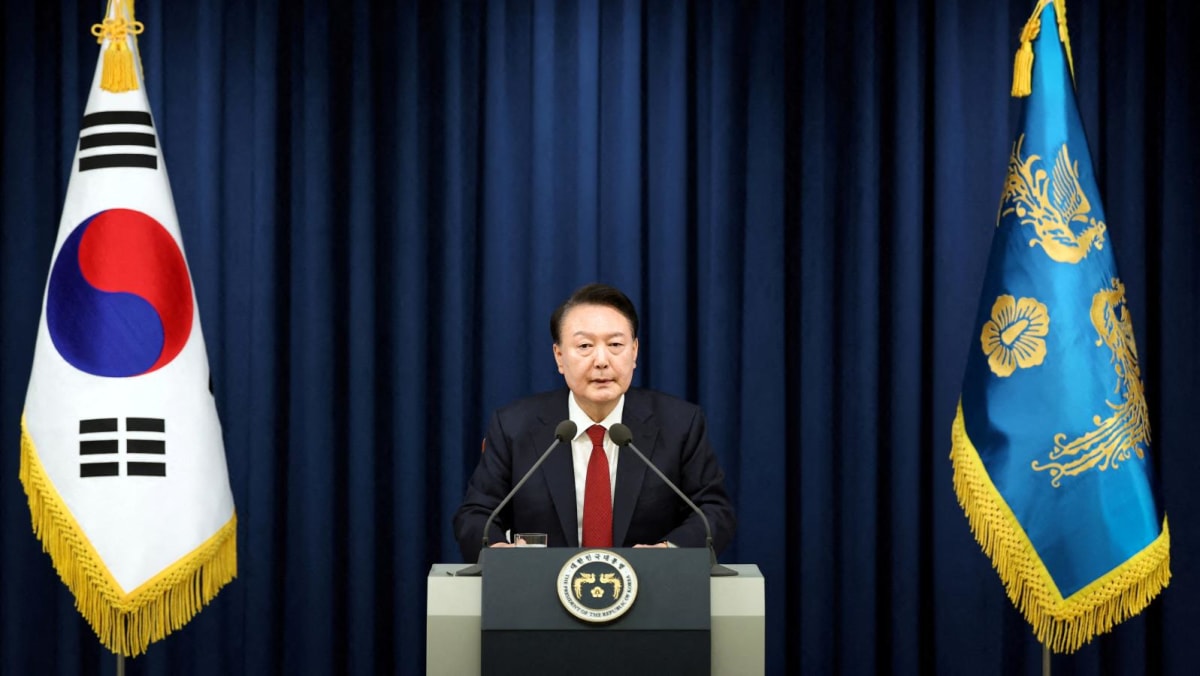South Korea Imposes Martial Law Citing Threats and Domestic Unrest
President Yoon Cites National Security Concerns
President Yoon declared emergency martial law in South Korea, marking the country’s first such move in over four decades. This extraordinary measure followed weeks of escalating tensions both domestically and on the Korean Peninsula.
“To safeguard a liberal South Korea from the threats posed by North Korea’s communist forces and to eliminate anti-state elements plundering people’s freedom and happiness, I hereby declare emergency martial law,” Yoon said in a somber televised address.
Yoon’s statement offered broad justifications, mentioning threats from North Korea without providing specific details. The two Koreas remain technically at war, with Pyongyang possessing a growing arsenal of nuclear weapons, creating a persistent source of anxiety in the region.
Accusations Against Opposition Party
“Our National Assembly has become a haven for criminals, a den of legislative dictatorship that seeks to paralyse the judicial and administrative systems and overturn our liberal democratic order,” Yoon asserted.
He went further, labeling the main opposition Democratic Party, which holds a majority in the 300-member parliament, as “anti-state forces intent on overthrowing the regime”. This sharp rhetoric underscores the deep political divisions within South Korea.
Budget Battle Fuels Tensions
The decision to impose martial law comes amid a bitter political standoff between Yoon’s People Power Party and the opposition. The two sides have clashed repeatedly over the upcoming budget, with the opposition pushing for significant cuts to the government’s spending plans. Last week, opposition MPs approved a drastically reduced budget proposal through a parliamentary committee, further inflaming tensions.
Yoon’s approval rating has nose-dived to a mere 19 percent in the latest Gallup poll, reflecting public discontent with his handling of the economy and controversies surrounding his wife, Kim Keon Hee. This widespread dissatisfaction appears to have played a role in the president’s decision to take such a drastic measure.
Uncertain Future for South Korea
The imposition of martial law has sent shockwaves through South Korea and the international community. It remains unclear how long this state of emergency will last, and what impact it will have on the country’s political landscape and its relationship with North Korea.
What are the potential ramifications of South Korea’s martial law declaration for its relationship with the United States?
## South Korea’s President Declares Martial Law: A Nation on Edge
**[Intro Music]**
**Host:** Good evening and welcome to the program. South Korea today took a drastic step, declaring emergency martial law for the first time in over four decades. Joining us tonight to discuss this unprecedented development is Dr. Lee Mina, an expert on Korean politics and international relations from the Institute for East Asian Studies. Dr. Lee, thank you for being with us.
**Dr. Lee:** It’s a pleasure to be here.
**Host:** Can you shed some light on the situation leading up to this declaration of martial law?
**Dr. Lee:** Certainly. Tensions have been simmering for weeks both domestically and on the Korean Peninsula. President Yoon cited threats from North Korea as one justification, but he didn’t specify any concrete actions or incidents. There’s also been growing internal friction, [ [1](https://www.aljazeera.com/news/2024/12/3/south-koreas-president-declares-emergency-martial-law) ], with President Yoon accusing the opposition of engaging in anti-state activities. This has led to a highly polarized political environment.
**Host:** The move to impose martial law is certainly a drastic one. What are the potential implications, both domestically and internationally?
**Dr. Lee:** This is uncharted territory for South Korea in recent history. Domestically, the announcement has been met with a mixture of fear and outrage. Some people support the president’s decision, seeing it as necessary to maintain stability, while others worry about the curtailment of civil liberties and the potential for abuse of power.
Internationally, this move is likely to raise concerns in the global community. South Korea is a key ally of the United States, and this development could strain relations with democratic partners. It also adds another layer of complexity to an already precarious situation on the Korean Peninsula.
**Host:** President Yoon has emphasized national security concerns, linking internal unrest with external threats. What’s your assessment of this connection?
**Dr. Lee:** It’s a complex issue. While North Korea undeniably poses a security threat to South Korea, it’s important not to conflate domestic dissent with foreign aggression. Labeling opposition groups as “anti-state elements” is a dangerous oversimplification that can stifle legitimate political discourse and erode democratic norms.
**Host:** Thank you, Dr. Lee, for your valuable insights. This is certainly a developing situation that we will continue to monitor closely.
**[Outro Music]**


